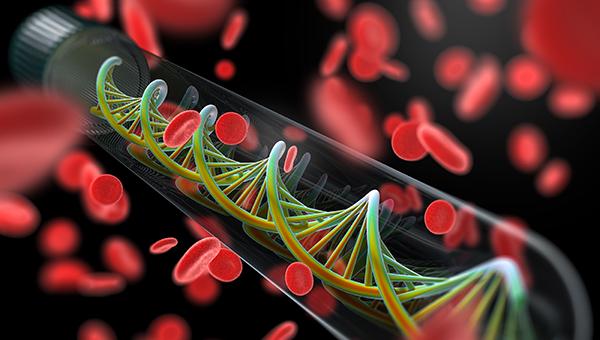Another Win for Guided P2Y12 Therapy in ACS: Meta-analysis
Access to genetic tests is limited right now, but experts call for industry to develop new technologies that can be easily used.

Compared with a standard selection of potent P2Y12 inhibitor therapy after ACS, a guided approach—via either platelet function or genetic testing—leads to better efficacy and safety, according to a new network meta-analysis of more than 60,000 patients.
The findings follow several publications this year, including a meta-analysis with all post-PCI patients from the same research group, similarly indicating that this more-tailored approach results in less bleeding without a trade-off in ischemic events. However, randomized trial evidence is still lacking, especially in the high-risk ACS cohort.
Regardless, lead author Mattia Galli, MD (Catholic University of the Sacred Heart, Rome, Italy, and University of Florida College of Medicine, Jacksonville), told TCTMD that at this point, guideline writing committees “cannot ignore” these results, which in his opinion justify a change to encourage a guided strategy.
“Now I think it's very important for people to understand how they can improve their clinical practice using these tools,” he said, adding that conducting genetic testing is “way easier than what a lot of people think.”
Similarly, Charanjit Rihal, MD (Mayo Clinic, Rochester, MN), who co-authored another meta-analysis of genetics-guided antiplatelet therapy published this year, told TCTMD these data cannot be ignored. “I'm very happy to see these results because I think they extend previous observations and previous studies nicely and kind of support the notion that we in the cardiology community really should be thinking more and more of [an] individualized or precision medicine approach for our patients,” he said.
While this analysis is not a definitive randomized controlled trial, the methodology of a network meta-analysis is such that it enables both direct and indirect comparison of multiple treatments and provides “strong evidence pushing us towards a certain practice paradigm,” Rihal observed.
Choosing the Right Drug
For the study, published online last week in the European Heart Journal, Galli and colleagues included 61,898 patients from 15 randomized trials that compared different oral P2Y12 inhibitors for the treatment of ACS using either a guided or standard selection approach.
Over a mean follow up of 11.9 months, only individualized treatment was associated with a reduction in MACE (incidence rate ratio [IRR] 0.80; 95% CI 0.65-0.98) without any increase in bleeding (IRR 1.22; 95% CI 0.96-1.55). Both a guided approach and prescribing prasugrel led to a decrease in MI, while a guided approach and prescribing either prasugrel or ticagrelor were all linked with reduced stent thrombosis. Total and cardiovascular mortality were lower with ticagrelor. Also, major bleeding increased with prasugrel and minor bleeding went up with both prasugrel and ticagrelor.
Using a model to account for the risks of bleeding and MACE, the authors ranked a guided strategy as the highest, followed by prasugrel, which was better than ticagrelor in terms of reducing MACE but similar in terms of bleeding risk. While clopidogrel ranked highest for bleeding, it not surprisingly ranked lowest for MACE.
“These findings support a broader adoption of tools, including platelet function and genetic testing, to enable a more personalized selection of antiplatelet therapy among patients with ACS,” the authors write.
Specifically, Galli said he would like to see genetic tests performed more often because the test results are turned around quickly. Platelet function testing can only be done for patients taking clopidogrel and many ACS patients are on more-potent agents as per guideline recommendations. “For example, if you have an NSTEMI patient, you can perform the genetic testing even before PCI,” he said. “It takes maybe 30 minutes. So at the moment of PCI you will be able to know if the patient will be a responder to clopidogrel and go straight with a clopidogrel loading dose. Otherwise, you can go straight with a prasugrel or ticagrelor strategy.”
For patients with ACS, knowing if they’ll respond to clopidogrel is important not only in the acute setting but long term, Galli added.
Stepping Up to the Plate
Access to these genetic tests can pose a challenge because the technology used in the TAILOR-PCI trial was manufactured by a company called Spartan Bioscience that recently went out of business. “The good news is that [the] technology has been rescued and will be further developed and sold by a different company,” Rihal said. “But we can't rely on just one start-up for this. We need industry to really step up to the plate and develop things that we can use in the cath lab.”
If it seems like there is interest and a market for new point-of-care devices, he added, they will come.
While Rihal said that he hopes guideline committees will take note of these data and others that come out in the near future, “more data and more innovative trials” are welcome, he added. “For example, and I know people are already doing trials like this, a question is: could a guided approach make ultrashort antiplatelet therapy safe and effective after PCI? If we had guided treatment and I knew that my patient was responsive to clopidogrel, would I then maybe use it just for a month in certain low-risk patients?”
He also encouraged hospitals to dig deep into their outcomes and “identify which patients are doing well that are low risk in whom therapies could be de-escalated using a guided approach. And they also need to identify which patients are running into problems, and perhaps using a guided approach could help them escalate treatments in those patients,” Rihal said.
Yael L. Maxwell is Senior Medical Journalist for TCTMD and Section Editor of TCTMD's Fellows Forum. She served as the inaugural…
Read Full BioSources
Galli M, Benenati S, Franchi F, et al. Comparative effects of guided vs. potent P2Y12 inhibitor therapy in acute coronary syndrome: a network meta-analysis of 61 898 patients from 15 randomized trials. Eur Heart J. 2021;Epub ahead of print.
Disclosures
- Galli reports receiving support by a grant from Fondazione Enrico de Enrica Sovena.
- Rihal reports no relevant conflicts of interest.





Comments